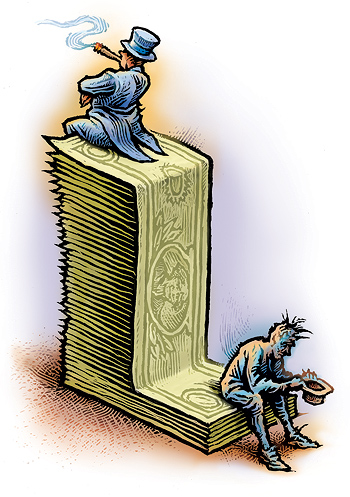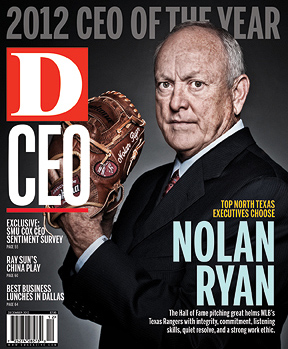The rich are getting richer, the poor are becoming more plentiful, and, as with many things, it’s all bigger in Texas.
That’s the takeaway from two recent reports highlighting an ugly backdrop to the American economy—the huge and growing chasm of income inequality.
Most people are making less money two years after the Great Recession came to an end, according to the annual American Community Survey from the U.S. Census Bureau, and poverty is at its highest point in nearly 30 years.
In 2011, median household income in the United States was $50,502—8 percent less than before the economic collapse in 2007. During that time, the percentage of households earning less than $35,000 grew from 32.1 percent to 35.6 percent.
In Dallas County, an even bigger chunk of the population made less than $35,000: 37.2 percent. And the income gap is more exaggerated: 4.7 percent of Dallas County households took in more than $200,000 last year (vs. 4.3 percent nationwide) and 20.1 percent of its residents were living in poverty (15.6 percent nationwide).
The mega-rich, meanwhile, are doing just fine. In its annual “rich list” published in September, Forbes magazine reported that total net worth of the 400 richest Americans was $1.7 trillion, up 13 percent in a year, thanks to a strong stock market and rebounding housing prices.
The Forbes list includes 16 from Dallas, with a combined net worth of $51.6 billion, an amount that would take the bottom third of households in Dallas County (some 300,000) more than six years to amass, assuming average annual income of $25,000.
So what’s the big deal if the gap between rich and poor is at historic levels? Isn’t the possibility of becoming filthy rich what makes this country great?
Well, yes and no. Certainly everyone wants their kids to have a shot at becoming rich. But there’s a growing body of academic research concluding that the widening gap between rich and poor is making the American Dream into a myth and destabilizing our economy.
In his new book, The Price of Inequality, Nobel Prize-winning economist Joseph Stiglitz the case that the widening income gap is leading to a divided nation, where the poor have less chance of moving up and the rich have little risk of moving down. One result, he writes, is a sluggish economy.
Stiglitz says when the top 1 percent of society is sitting on so much of the country’s wealth, there’s less available to move through the economy—stunting growth and stifling investments in education, healthcare, and transportation.
Free-market advocates dismiss this talk as the blathering of redistributionists. Pam Villarreal, a senior fellow at the National Center for Policy Analysis in Dallas, says government regulation, not income inequality, is holding back the economy and personal income. More jobs will help people move up the ladder.
But the inequality argument is gaining followers, from the Occupy Wall Street crowd to some at the very top of the income chain. Investor Warren Buffett, the second-richest man in America, has famously said that he should be paying more in taxes, leading pundits to dub an initiative to ensure that millionaires pay a higher tax rate than the middle class “the Buffett Rule.”
Buffett has also taken a stand against generational wealth, and is putting his money where his mouth is. In 2006, he pledged to give away more than 80 percent of his money. His reasoning? Outsized riches fl ow directly from American society, and so should return there.
If you think this might upset his kids, you’re wrong. Peter Buffett, one of Warren’s sons, tells the story of his father giving him stock worth about $90,000 in the 1970s so he could begin his adult life. Peter sold the shares—stock that today would be worth more than $70 million—to pursue a career as a musician. But he has no regrets. As he says, he’d rather have his own life than the money.
“I don’t think money is really money unless it moves through a system,” he said in an interview before a recent concert in Dallas. “Otherwise it’s fear or greed or something.”
In Texas, the state’s fast-growing Hispanic population adds another factor to the mix, according to SMU political science professor Cal Jillson. The high Hispanic dropout rate leads to lower incomes, widening the overall gap in Texas and threatening the state’s economic future.
Jillson, who penned a scathing critique of the state’s low-tax, limited-government culture in Lone Star Tarnished, says the state will be “in a world of hurt” if it doesn’t make sure that its dominant Hispanic work force is better educated and prepared for the jobs of tomorrow. Education should be the top priority when the Legislature convenes next month in Austin. Cutting state funding for schools once again, he says, would be “idiocy.”
Along with its rich list, Forbes published a series of stories on philanthropy, implying that the nation’s massive concentration of wealth is being put to good use.
Such big giving is admirable, Jillson says, citing donations that have built the Dallas Arts District. But it doesn’t get to the crux of the matter.
“That is a wonderful addition,” he says, “but it won’t educate those poor children who are scattered throughout the city.”






